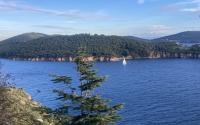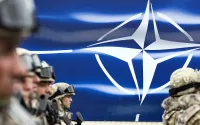4th November 2008
Can it happen? Are the Bush years going to end with the election of a cerebral, liberal black man born to a Muslim goat-herd from Kenya and an atheist farm-girl from Kansas? Will we witness it in less than 48 hours? Whisper it: yes we can. At the midnight hour tomorrow night – unless opinion polls are wrong; more wrong than they have ever been – the era of President Barack Obama will begin.
It's hard to see what this will mean for the world yet. Obama himself has written: "I serve as a blank screen on which people of vastly different political stripes project their own views." But we can already map out the four tectonic shifts rumbling beneath this election. They all began before Obama – but his cool stride has brought them into history sooner than many of us thought possible.
Transformation One: The Transcending of Race. Just 40 years after Martin Luther King had a dream of a post-racial America, a coalition of white workers in Pennsylvania, retired Jews in Florida, and bilingual Hispanics in New Mexico is poised to put a black man in the White House. If the polls are right, Obama will be the first Democrat to win a majority of white votes since 1964.
This hints at one of the reasons why so many of us love the United States, even as we hate some of its actions. The country is capable of many crimes – but it is also open and free enough to produce the antibodies that begin to put them right. It gives us Dick Cheney, but also Noam Chomsky. It gives us Jim Crow, but also Barack Obama. Is there any better symbol of how the American Revolution can correct itself than the realisation that the first 26 Presidents of the US could have owned the 44th President as a piece of property?
This shift will only accelerate. By 2040, white people will be a minority in America, part of a patchwork of ethnic minorities. The US will look more and more like a universal nation of peoples from everywhere, united behind the constitution. Young Americans are strikingly relaxed about this: for under-30s, Obama has a 47 per cent lead. Not a 47 per cent vote – a 47 per cent lead.
Yet the US state is still riddled with racist outcomes. To give just one example: the American Civil Liberties Union found in 2006 that although the races use drugs at the same rate, black Americans – who comprise 12 per cent of the population – make up 74 per cent of all drug offenders sentenced to prison. Obama could very easily have slipped into this vortex when, as a young man, he occasionally snorted coke. If he had been arrested and jailed for it like one in five black men, he wouldn't be President; he wouldn't even be able to vote. This election shows a desire by American people to move beyond the sterile stupidities of racism, but it is the middle of the story, not the end.
Transformation Two: The Death of Reaganism. For a generation, American Presidents have pledged to roll back the state and let the market rip. Even Democrats bowed to this orthodoxy: it was Bill Clinton was said "the era of big government is over" and began deregulating the banks. The result was the financial collapse and the worst inequality since the 1920s. Today, the top one per cent of Americans own 21 per cent of all income – while the bottom 50 per cent own just 13 per cent. Obama, by contrast, ran mocking "the idea we can give more and more to the most, and somehow prosperity will trickle down", and argued for the state to "spread the wealth around". The era of limp, passive government is over – at precisely the moment when we need athletic government to prevent a depression and stop global warming.
Transformation Three: The Palin' of the Culture War. For decades now, the American right has successfully disguised its help-the-rich, slap-the-rest ideology by presenting Democrats as out-of-touch elitists on the social issues: God, guns and gays. This election, the trick stopped working. Sarah Palin made the base gurgle, but her cultural wedgies repelled everyone else. The real elite have been laid bare on Wall Street; shrieks of "elitism!" from their deregulators and defenders now sound absurd. We have been here before: the 1920s was a culture war decade, with bitter moral crusades for Prohibition and against Catholics. In the 1930s, it all died off in the dust bowl.
Transformation Four: The End of the Unipolar Fantasy. The Bush administration believed that, as the last remaining super-power, it could impose its will on the world with force. It made little effort to compromise with – or even listen to – a world it wanted to bring to heel. It boasted of the need to maintain "full spectrum dominance" over the planet, and to have more firepower than all their potential rivals combined. It trashed treaties, scorned the UN, and refused to talk to anybody they disagreed with. It was always doomed to failure, because very few international problems can be handled with force. You can't fire cruise missiles at an unravelling climate or a tricky peace process or bird flu.
But what now? A man with a background among the colonised has never before become the head of the world's largest empire. Obama's grandfather was detained in a British Guantanomo for six months during the bloody occupation of Kenya. As a child, Obama watched helpless as the CIA armed and funded the crazed dictator Suharto to commit mass murder of civilians. Yet how much has this informed Obama's policies, as a pragmatic politician working within a system riddled with undemocratic pressures?
He certainly disagrees with many of the vicious extremes of Bush, from Iraq to torture. His plans for a massive investment in renewable energy to wean the US slowly off its addiction to oil will have transformed the country's foreign policy, ending its need for the Saudi tyranny and bursts of war in Mesopotamia.
But in the medium term, it seems that Obama will be a conventional Democratic multilateralist leaving in place many of the ugly aspects of US foreign policy – from the crowbar-policies of the International Monetary Fund to unwavering support for the thuggish governments of Egypt, Colombia and Israel.
The democratic antibodies of opposition aren't strong enough to overturn the Big Money or hard geopolitics that demand these policies. So there will still be plenty to oppose in Obama's foreign policy – but when a giant shuffles just a few steps to the left, the ants below feel a great pressure lifting from them.
But then the cold fear comes: what if the American people are too addled by the race-fear, and turn to McCain at the last moment? At the Democratic convention, Obama said to his fellow Americans: "We are better people than the last eight years." The ghosts of the drowned children of New Orleans and the burned children of Baghdad may have stared down sceptically – but I believe he was right. The tidal force of these four transformations is too great. And yet, and yet... I won't be sure until I watch Obama's acceptance speech through salty tears – and I hear the Statue of Liberty let out a slow sigh of relief.






